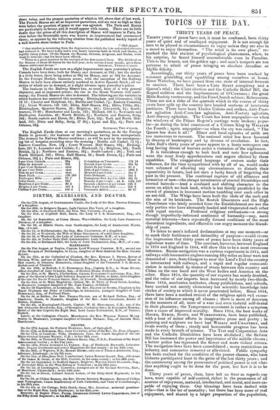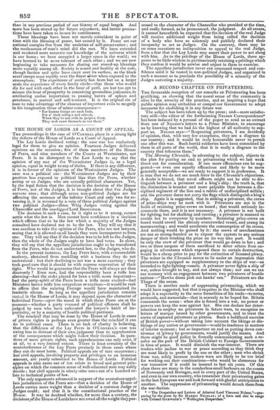TOPICS OF THE DAY.
THIRTY YEARS OF PEACE.
THIRTY years of peace have not, it must be confessed, been thirty years of quiet and of unalloyed enjoyment. It is not enough for men to be placed in circumstances to enjoy unless they are also in a mood to enjoy themselves. " The mind is its own place," re- marked the first student of psychological phmnomena, when, to his surprise, he found himself uncomfortable even in Paradise. This is the brazen, not the golden age ; and men's tempers are too perverse to admit of peace bringing an absolute Arcadian or Idyllic felicity.
Accordingly, our thirty years of peace have been marked by constant grumbling and squabbling among ourselves at home. Since Waterloo, we have passed from one state of internal ferment to another. There have been a Cato Street conspiracy and a Queen's trial ; the Clare election aud the Catholic Relief Bill, the Repeal sedition and the imprisonment of O'CoNNELL ; the great Bible Society controversy, and the Free Church schism ; Rebeccaism. These are not a tithe of the quarrels which in the course of thirty years have split up the country into banded sections of inveterate partisans. There have been Trades Unions and strikes, Anti-Poor- law agitation Anti-Corn-law agitation, Anti. Factory agitation, Anti-Slavery agitation. The Court has been unpopular—as when the windows of the Prince Regent's carriage were broken ; popu- lar—as during the brief enactment of a Citizen King by WILLIAM the Fourth ; again unpopular—as when the cry was raised, "The Queen has done it all !" Minor and local episodes of strife are too numerous to recount. The national mind has been haunted by dreams of bankruptcy and by dreams of revolution. In fact, John Bull's thirty years of peace appear to a hasty retrospect one long lasting dream of horrors under a visitation of the nightmare.
It is ridiculous enough to look back and note how ephemeral were the most lively apprehensions and angers elicited by these squabbles. The exaggerated language of orators under their influence, for the time sympathized with by all of us, would make men ashamed of allowing any circumstances to disturb their equanimity in future, had not men a lucky knack of forgetting the past in the present. The continual rupture of old alliances and formation of new—the abrupt termination of eternal friendships and eternal hatreds—lend a confused and shifting character to the scene on which we look back, which is but faintly paralleled by the crowd of pismires in incessant motion tumbling over each other in an ant-hill. The Whigs have been both the idols of the mob and the aim of its brickbats. The Scotch Dissenters and the High Churchmen who lately seceded from the Establishment are not the only parties who have alternately lauded and vituperated each other
with equal unction. Profound religious enthusiasm—a strong though imperfectly-informed sentiment of humanity—nay, mere material interests—have repeatedly formed coalitions of the most discordant ingredients, and effaced in one angry moment the friend- ship of years.
To listen to men's inflated declamations at any one moment—or to mark their feebleness and imbecility of purpose—would create the impression that thirty years of peace have been thirty years of inglorious waste of time. The contrast, however, between England in 1814 and England in 1844, will show this to be a most erroneous inference. Steam-navigation was a curious experiment in 1814, and railways with locomotive engines running fifty miles an hour were not dreamed of : now, from Glasgow to near the Land's End the country is intersected with railways, and a rapid and regular comtnuni- cation is maintained by means of steam between this country and China on the one hand and the West Indies and America on the other. Since 1814, the quantity of our exports has nearly doubled, and the value of our imports been increased by nearly two-thirds. Since 1814, mechanics institutes, cheap publications, and schools, have carried not merely elementary but scientific knowledge into circles of society to which it never penetrated before. Since 1814, there have been a marked revival of the religious spirit and exten- sion of its influence among all classes ; there is more of decorum in the manners of all, more of a wise aild even tasteful self-denial in their pleasures; the Temperance movement is rather a symptom than a cause of improved morality. Since 1814, the best works of Moorts, BYRON, SCOTT, and WORDSWORTH, have been published, with a host of minor efforts in imaginative prose and poetry ; in painting and sculpture we have had WILKIE and CHANTHEY, and rivals worthy of them ; steady and honourable progress has been made in every branch of science. The Test and Corporation Acts and the Catholic Disabilities have been abolished ; the Reform Bill has increased the power and importance of the middle classes ; a better police has repressed the fiercer and more violent crimes. The navigation-laws have been consolidated ; many restrictions on industry and commerce removed or alleviated. Public sympathy has been excited for the condition of the poorer classes, who have hitherto participated least in the gains of the last thirty years ; and the controversy among the possessors of political power is not whe- ther anything ought to be done for the poor, but how it is to be done.
Thirty years of peace, then, have left us freer as regards our laws, more capable of self-control, richer in the possession of all sources of enjoyment, material, intellectual, and moral, and more ca- pable of enjoying them. Our blessings have been dashed with evils—that is the lot of mortality ; but there has been more of real enjoyment, and shared by a larger proportion of the population, than in any previous period of our history of equal length. And more has been stored up for future enjoyment, and better precau- tions have been taken to insure its continuance.
These blessings have been not merely coincident in point of time with the blessing of peace, but caused by it. Peace set our national energies free from the anxieties of self-preservation ; and the restlessness of man's mind did the rest. We have extended and rendered more accurate our knowledge of the universe which is our home ; we have occupied a larger space in the world; we have learned to be more tolerant of each ocher; and we are now beginning to take measures for sharing our stored-up blessings more equably among all. Society is sound and healthy at the core, though faction and spite have crept over its surface, as the black scurf creeps most rapidly over the finest silver when exposed to the atmosphere. The experience of society has been but on a larger scale the experience of every family circle—that those who would die for and with each other in the hour of peril, are but too apt to misuse the hour of prosperity in conceiving groundless jealousies, in attributing undue importance to passing bursts of spleen and petulance, in mutual and self-torment. It is the original sin of man to take advantage of the absence of important evils to magnify in his imagination those of minor consequence-
" For human beings are such fools,
For a' their colleges and schools, When they've nae evils to perplex them, They mak mow themsels to vex them."



























 Previous page
Previous page